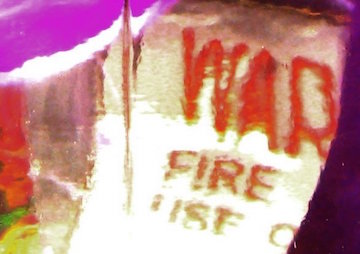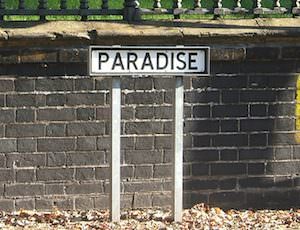America’s Reckless War Against Evil
After the attacks in Paris, Barack Obama called Islamic State “the face of evil.” The “evildoers” are back. And from every mountaintop, it seems, America rings with calls to ramp up its war machine. Kevin Dooley / CC BY 2.0
1
2
3
Kevin Dooley / CC BY 2.0
1
2
3
Oh, no! Not another American war against evil!
This time, it’s the Islamic State (IS). After the attacks in Paris, Barack Obama, spokesman-in-chief for the United States of America, called that crew “the face of evil.” Shades of George W. Bush. The “evildoers” are back. And from every mountaintop, it seems, America now rings with calls to ramp up its war machine.
By the way, George W., how did that last war against the “evildoers” work out for you? Not quite the way you expected, right? I bet you didn’t imagine that your Global War on Terror would plant the seeds of an Islamic State and turn significant stretches of Iraq (and Syria) into fertile soil in which IS would grow into a brand new, even more frightening enemy.
But that’s the way wars against evil always seem to work.
Pardon me if I vent my exasperation with all the Washington policymakers, past and present, surrounded by their so-called experts and those war-drum-beating pundits in the media. I know I shouldn’t be shocked anymore. I’ve seen it often enough as a historian studying wars against evil in the past — ever since biblical times, in fact — and as a citizen watching wars in my own lifetime, ever since the one that tore Vietnam (and, incidentally, America) apart.
Still, it drives me crazy to watch policymakers and experts making the same dumb mistakes time after time, several mistakes, actually, which synergistically add up to one self-defeating blunder after another.
What’s worse, the dominant trend in public opinion is so often on the side of just those mistakes. You’d think someone would learn something. And in that someone I include “we, the people,” the nation as a whole.
Yet now, facing the Islamic State, you guessed it: we’re doing it all over again.
Let me try to lay out our repetitive mistakes, all six of them, one by one, starting with…
Mistake Number One: Treating the enemy as absolute evil, not even human.
Barack Obama called the Paris tragedy “an attack on all of humanity,” which means that, even for the president, IS fighters stand outside that category. They are evidently some other species and merely appear to be human. And this was the mildest of descriptions in this overheated political season of ours. “The face of evil” sounds modest indeed compared to the vivid images offered by the Republicans vying to replace him. For Ben Carson, IS are a bunch of “rabid dogs”; for Ted Cruz, “scorpions.” Donald Trump calls them “insane,” “animals.”
All point to the same dangerous conclusion: Since we are human and they are not, we are their opposite in every way. If they are absolute evil, we must be the absolute opposite. It’s the old apocalyptic tale: God’s people versus Satan’s. It ensures that we never have to admit to any meaningful connection with the enemy. By this logic, it couldn’t be more obvious that the nation our leaders endlessly call “exceptional” and “indispensable,” the only nation capable of leading the rest of the world in the war against evil, bears no relationship to that evil.
That leads to…
Mistake Number Two: Buried in the assumption that the enemy is not in any sense human like us is absolution for whatever hand we may have had in sparking or contributing to evil’s rise and spread. How could we have fertilized the soil of absolute evil or bear any responsibility for its successes? It’s a basic postulate of wars against evil: God’s people must be innocent.
As a result, we don’t need to look at all the ways in which the U.S., even in battle mode, continues to contribute to the successes of Islamic State fighters in Sunni Arab lands by, for instance, supporting an Iraqi Shi’ite regime in Baghdad that has a grim history of oppressing Sunnis, a history that drives many of them to tolerate, or even actively support IS.
By refusing a future role of any sort for Syria’s president Bashar al-Assad, we have hindered the diplomatic process that might heal the civil war in that country. Instead we let the Syrian chaos continue as a breeding ground for IS expansion (though perhaps this policy is just beginning to change). Our long-term alliance with Saudi Arabia is equally counterproductive, protecting funding networks that feed a burgeoning caliphate.
Just as we don’t look at all this in the present, so we blind ourselves to what the U.S. has done in the past. Consider this…
Mistake Number Three: Call it blotting out history. We lose the ability to really understand the enemy because we ignore the actual history of how that enemy came to be, of how a network of relationships grew up in which we played, and continue to play, a central role.
The historical record is clear for all who care to look: The U.S. (the CIA in particular) was a key to the creation, funding, and arming of the mujahidin, the rebel fighters in Afghanistan who took on the Soviet army there in the 1980s, the men (often extreme Islamists) whom President Ronald Reagan compared to our founding fathers. From that situation came al-Qaeda.
Your support matters…Independent journalism is under threat and overshadowed by heavily funded mainstream media.
You can help level the playing field. Become a member.
Your tax-deductible contribution keeps us digging beneath the headlines to give you thought-provoking, investigative reporting and analysis that unearths what's really happening- without compromise.
Give today to support our courageous, independent journalists.





You need to be a supporter to comment.
There are currently no responses to this article.
Be the first to respond.